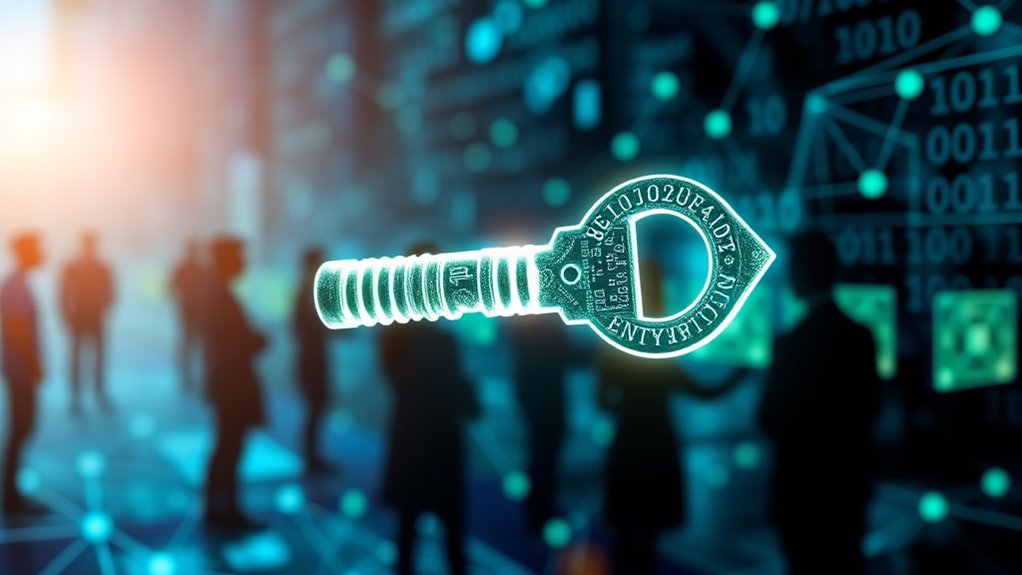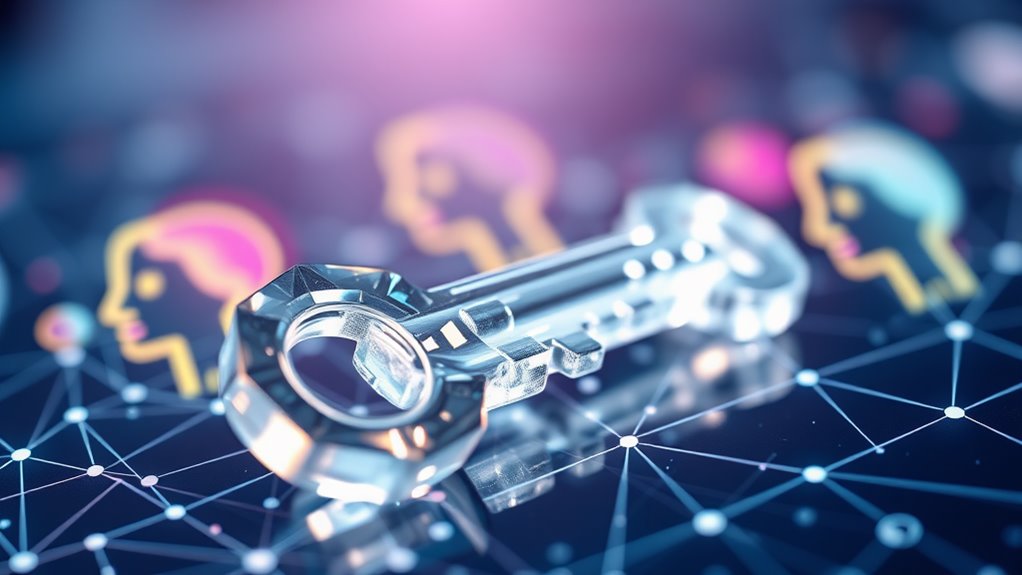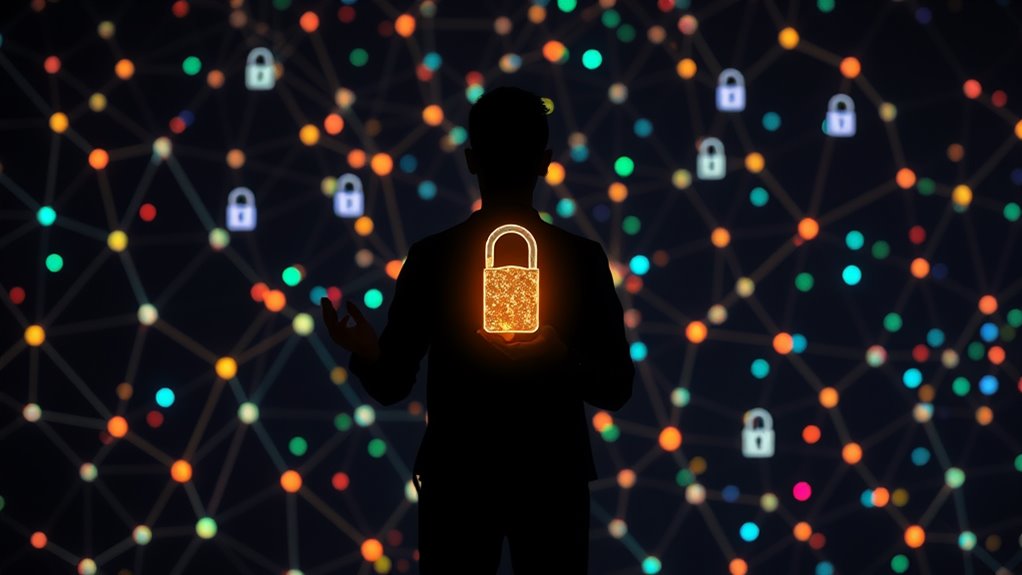
Decentralized Identity and Web3: Unlocking User Sovereignty in Digital Spaces
Decentralized identity and Web3 technologies offer individuals enhanced control over their digital identities. Through Self-Sovereign Identity (SSI) and Decentralized Identifiers (DIDs), users manage their personal information without relying on central authorities, thereby reducing risks of data breaches. This system enhances security and privacy by using blockchain technology. Additionally, it promotes economic participation and fair access to services. Understanding these advancements will provide insights into the future of personal data management and user sovereignty in digital spaces.
Key Takeaways
- Decentralized identity empowers users by providing control over their personal data, eliminating reliance on centralized authorities.
- DIDs enhance privacy and security while enabling seamless access across various platforms through unique, user-controlled identifiers.
- Verifiable Credentials allow individuals to authenticate their identity without revealing sensitive information, promoting minimal data disclosure.
- The immutable nature of blockchain ensures data integrity and auditability, fostering trust in digital interactions.
- Challenges like interoperability and scalability must be addressed to fully realize the benefits of decentralized identity in Web3.
Understanding Decentralized Identity in the Web3 Landscape

In the evolving landscape of Web3, understanding decentralized identity is essential for recognizing how it transforms digital interactions. Central to this concept are Decentralized Identifiers (DIDs), unique user-generated identifiers that operate independently of central authorities.
These DIDs are often stored on blockchain networks, ensuring security and immutability. Verifiable Credentials (VCs), which are digital certificates verifying identity information through cryptographic methods, add another layer of trust.
Users can manage their DIDs and VCs through digital wallets, such as MetaMask, enhancing their control over personal data. The benefits of decentralized identity include increased privacy, user autonomy, and reduced identity theft.
However, challenges like scalability, regulatory frameworks, and usability must be addressed for broader acceptance in digital environments.
The Role of Self-Sovereign Identity (SSI)

Self-Sovereign Identity (SSI) plays an essential role in empowering individuals by giving them complete control over their personal data.
By eliminating the need for intermediaries, SSI enhances privacy and security, allowing users to manage their identities in a more secure manner.
This approach not only protects sensitive information but also fosters a more streamlined and trustworthy digital ecosystem.
Empowering Personal Data Control
Empowering personal data control is an essential aspect of modern digital interactions, especially in the context of Self-Sovereign Identity (SSI). SSI allows individuals to share only necessary information, which enhances privacy and reduces the risk of data breaches.
Technologies like zero-knowledge proofs enable users to verify their identity without disclosing sensitive details, thereby protecting their privacy. In addition, users store their credentials securely in digital wallets, minimizing reliance on centralized databases that may be vulnerable to attacks.
Eliminating Intermediaries Effectively
With the rise of digital interactions, the need to eliminate intermediaries in identity management has become increasingly apparent. Centralized identity systems expose users to risks such as data breaches and surveillance, as they rely heavily on third-party providers.
By adopting decentralized identity models, individuals can manage their identities directly, enhancing control and security.
- Centralized systems simplify access for attackers.
- Decentralized Identifiers (DIDs) provide unique, user-controlled identities.
- Blockchain technology guarantees data integrity and tamper resistance.
- Users can create multiple DIDs for different services, promoting privacy.
- A user-centric approach reduces the potential for data misuse.
In this context, Self-Sovereign Identity (SSI) emerges as a solution for safer, more autonomous digital experiences.
Enhancing Privacy and Security
In the digital era, privacy and security have become paramount concerns for individuals managing their online identities. Self-Sovereign Identity (SSI) addresses these issues by granting users full control over their personal data, allowing them to decide what to share and with whom.
This approach emphasizes minimal disclosure, enabling users to provide only essential information for transactions. Moreover, SSI employs zero-knowledge proofs, which validate data without revealing it. Data is securely stored on personal devices, reducing dependence on centralized systems.
In addition, verifiable credentials enhance security by being cryptographically verified, while decentralized networks protect against attacks. Ultimately, SSI empowers users by providing flexible authentication options and improving the overall security and privacy of digital interactions.
Leveraging Decentralized Identifiers (DIDs) for User Control

Decentralized Identifiers (DIDs) offer a framework for users to manage their digital identities independently, without reliance on centralized authorities.
By enhancing user autonomy, DIDs empower individuals to control their personal data, promoting privacy and security in online interactions.
This technology not only facilitates seamless access across various platforms but also reinforces the importance of data ownership in the evolving landscape of Web3.
Understanding Decentralized Identifiers
As individuals navigate the digital landscape, understanding Decentralized Identifiers (DIDs) becomes essential for maintaining control over their online identities.
DIDs empower users by providing a unique identifier that does not rely on centralized authorities, ensuring greater security and privacy.
Key aspects of DIDs include:
- Global Uniqueness: Each DID is a distinct identifier for an entity.
- Decentralization Benefits: They eliminate reliance on central registries.
- DID Documents: These contain essential data for authentication and verification.
- Verification Methods: Users can prove control over their DIDs through digital signatures.
- Interoperability: DIDs facilitate seamless interactions between different identity systems.
Enhancing User Autonomy
While maneuvering through the complexities of online identity, users increasingly seek tools that grant them greater control over their personal information. Decentralized Identifiers (DIDs) provide users with autonomy through decentralized control, allowing them to manage their digital identities without relying on central authorities. These identifiers enable cryptographic verification, guaranteeing authenticity while keeping personal data securely stored in private wallets. Users can interact across various platforms without compromising their information.
| Feature | Description | Benefit |
|---|---|---|
| Decentralized Control | Users manage their identities independently | Eliminates reliance on others |
| Cryptographic Verification | Authenticity guaranteed through blockchain | Builds trust in interactions |
| Secure Storage | Credentials held in personal wallets | Protects against data breaches |
| Selective Disclosure | Users share only necessary information | Enhances privacy and control |
Ensuring Data Privacy
How can individuals truly maintain control over their personal information in an increasingly interconnected digital landscape? Decentralized identifiers (DIDs) offer a powerful solution by enabling users to manage their digital identities independently. This approach enhances data privacy and fosters self-sovereignty.
- DIDs allow users to control what personal data is shared.
- Self-sovereign identity (SSI) guarantees secure management of digital identities.
- Verifiable credentials (VCs) enable selective sharing of information.
- Blockchain technology supports secure data handling, minimizing risks.
- Consent-based systems guarantee explicit user approval for data access.
These mechanisms collectively empower individuals, allowing them to navigate digital spaces with greater confidence and control over their personal information, ultimately promoting a safer online experience.
Security and Privacy Enhancements Through Blockchain Technology

Blockchain technology considerably enhances security and privacy by utilizing decentralized systems that distribute data across a network. This distribution makes it challenging for attackers to manipulate information without detection, as there are no single points of failure.
Additionally, blockchain’s immutable nature guarantees that audit trails remain permanent, which is crucial for maintaining data integrity. Cryptographic techniques safeguard user identities, allowing only authorized access.
Blockchain’s immutable design ensures permanent audit trails, crucial for data integrity, while cryptography protects user identities and enforces authorized access.
Privacy-enhancing technologies, such as zkSNARKs, enable anonymous transactions, further protecting personal data. Users gain control over their digital identities, managing what information is shared through selective disclosure. Furthermore, the implementation of decentralized identity systems is revolutionizing how users interact with digital platforms.
However, challenges persist, particularly regarding data recovery when decryption keys are lost. Overall, these enhancements position blockchain as a powerful tool for security and privacy.
Economic and Social Impacts of Decentralized Identity

Decentralized identity systems have the potential to considerably reshape economic and social landscapes by addressing longstanding issues related to traditional identity verification methods.
These systems promote wider participation in the economy and improve access to essential services.
- Economic Inclusion: They lower barriers for those lacking formal identification.
- Cost Reductions: Organizations save on identity verification expenses.
- Equitable Access: Access to government services becomes fairer for all demographics.
- User Empowerment: Individuals gain control over their own data, fostering trust.
- Privacy Preservation: Users can selectively share information, enhancing privacy.
Navigating Challenges and Future Developments in Decentralized Identity Systems

As the digital landscape evolves, steering through the challenges and future developments in decentralized identity systems becomes increasingly critical.
Decentralized identity allows users to control their personal data without relying on centralized authorities, utilizing blockchain and cryptography for security. However, challenges such as interoperability issues, limited scalability, and the complexity of integrating with legacy systems hinder widespread adoption.
Decentralized identity empowers users with control over personal data, yet faces hurdles like interoperability and scalability challenges.
Furthermore, the lack of clear regulations creates uncertainty around data protection. Future developments may focus on enhancing scalability through Layer 2 solutions and establishing interoperability standards.
As decentralized identity systems advance, user education will be essential to guarantee understanding and engagement, aligning with the broader vision of Web3, which aims to enhance user autonomy and ownership in digital spaces.
Frequently Asked Questions
How Does Decentralized Identity Enhance User Trust in Digital Platforms?
Decentralized identity enhances user trust in digital platforms by providing secure, verifiable credentials and ensuring privacy through selective disclosure. This transparency fosters confidence, reducing reliance on central authorities and minimizing the risk of data breaches.
What Roles Do Third-Party Providers Play in Decentralized Identity Systems?
Third-party providers in decentralized identity systems facilitate interoperability and verification processes. They support the issuance and management of credentials, enhance trust through reputation systems, and provide tools for users to securely manage their identities without central control.
Can Decentralized Identity Systems Integrate With Existing Identity Verification Methods?
Decentralized identity systems can integrate with existing identity verification methods, leveraging standards and modular architecture. However, challenges such as technical complexity, regulatory compliance, and user education must be addressed to guarantee seamless interoperability and adoption.
What Are the Environmental Impacts of Blockchain Technology in Decentralized Identity?
Blockchain technology, like a double-edged sword, embodies both promise and peril. Its environmental impact includes high energy consumption, significant carbon footprints, and substantial electronic waste, challenging sustainability efforts while offering potential transparency in identity management systems.
How Can Users Recover Lost Access to Their Decentralized Identity?
Users can recover lost access to their decentralized identity by utilizing secure backups of private keys, employing identity wallets for credential management, and leveraging verification methods involving public keys and trusted issuers for re-establishing access.
Conclusion
Decentralized identity systems have the potential to greatly enhance user sovereignty in digital environments. By enabling individuals to control their personal information, these systems promote privacy and security. Notably, a study indicates that 70% of internet users express concern about data privacy. This statistic highlights the growing demand for solutions that empower users, making decentralized identity a vital development in the ongoing evolution of Web3. As technology progresses, addressing challenges in this area will be essential for wider adoption.














